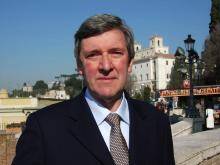‘The Catholic Church in Korea has hit the jackpot with Pope Francis!” That’s what Thomas Hong-Soon Han told me in Seoul as the pontiff’s amazingly successful visit ended. He believes many Koreans will now want to join the church because of Francis, but he’s not sure it’s prepared for this.
Han knows the situation well, having been president of Korea’s Catholic Lay Apostolate Council (2005-10) and South Korea’s ambassador to the Holy See from 2010 to 2013.
Han and several Korean reporters said no leader in living memory has received such a tremendous welcome from Koreans, both Catholics and non-Catholics alike. The welcome given to Presidents Obama, Xi Jingping and John Paul II paled by comparison.
Koreans have never seen a leader like Francis, so humble, so sensitive to the sufferings and concerns of people, so coherent. “He does what he says,” several sources said. “There’s no leader like him in any of the Christian churches or among the Buddhists in Korea, and none in the political world,” Sung Jin Park, reporter for Yonhap, Korea’s main news agency, told me.
The Argentine pope reached Korean hearts by his warm, joyful personality, his use of a Kia-Soul economy car, his closeness to those who have suffered, his kissing of children and his openness to everyone.
They were profoundly moved that he met relatives of the victims of the Sewol ferry disaster four times, whereas President Park Geun-hye met one for the first time at the airport while waiting for Francis. The relatives gave him a yellow ribbon, which he wore on his cassock. The ribbon is a symbol of protest by the relatives who want an investigation into the disaster. When, after wearing it for half a day, someone told him, “It’s better not to wear the ribbon; the pope should be neutral,” he retorted, “One cannot be neutral in the face of human suffering.” President Park had hoped to gain political advantage from the visit, but the pope’s response to the Sewol relatives cast her in poor light.
Throughout Korea, people were touched as they watched on TV his tenderness with children bearing disabilities at KKottongnae, and his gentleness as he greeted seven elderly comfort women in Myeong-dong cathedral on Aug. 18 before Mass.
Francis reached people’s hearts too by recalling the suffering Koreans have endured “from years of violence, persecution and war” and the division of their homeland. He offered hope by assuring them that “peace can be won through quiet listening and dialogue, rather than by mutual recriminations, fruitless criticisms and displays of force.” Celebrating a Mass “for reconciliation in the Korean family,” he urged everyone, including the authorities, to show forgiveness and solidarity, saying it is the path to peace. Afterward, he was given a crown of thorns made out of wire from the fence at the demilitarized zone that divides Korea. He brought it back to the Vatican as a reminder of their suffering.
During Francis’ visit, he inspired this young, dynamic church of 5.4 million faithful (11 percent of the population) by beatifying 124 martyrs—all but one were laypeople—and by encouraging Catholics in this prosperous country to imitate these martyrs, who followed Christ and shared what they had with those in need. Aware that Korea’s Catholics come mostly from the middle and upper strata of society, Francis, in his talks, urged them to reach out more to those less well-off and on the periphery. He called on the whole country to become a leader in solidarity.
Even though the church in Korea owes its existence to laypeople, it has become clericalized. Addressing the bishops, Francis insisted that the laity be given their proper role and quipped that in the church of the first Korean martyrs “there was no temptation of clericalism; they were laypeople!”
Surprisingly, he did not have a meeting with the priests. The bishops had advised against it because of division among the clergy between those who are more socially-politically engaged and those who are not. Francis nevertheless addressed priests directly during the Mass for reconciliation.
Before that Mass, he embraced the country’s Christian, Buddhist and other religious leaders, saying: “We are all brothers. Let us walk together as brothers before God!”
During his visit, Francis reached out beyond Korea to the whole continent, but that’s another story.








